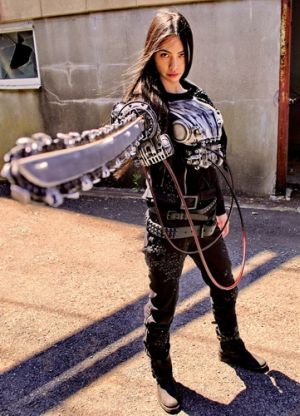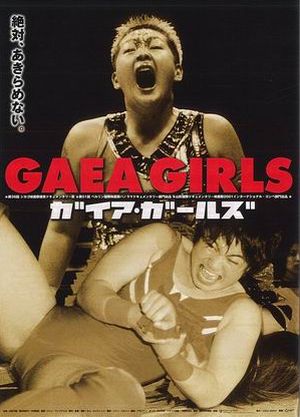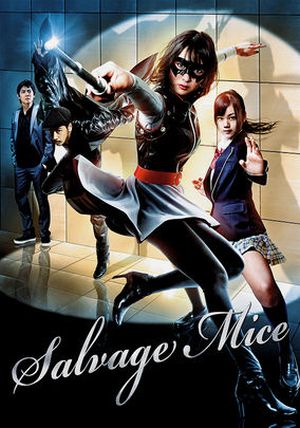 ★★★
★★★
“Brave, but too much heart?”
 I was immensely stoked for Brave on a number of levels. First, Pixar kicks ass. With the exception of the underwhelming Cars and its pointless sequel, the quality of their work speaks for itself: Monsters, Inc is close to the finest animated movie of all time. Secondly, genuine action heroine films for the whole family are rare, to the point that they can probably be counted on the fingers of one hand over the past 25 years. Thirdly, it’s Scotland. Y’know, where I’m from. It’s the bit at the top of England. I feel I should mention this, because Pixar had originally tabbed Reese Witherspoon to voice the teenage, Scottish heroine, Merida. Fortunately, scheduling prevented this, and Pixar ended up with an all-Scottish lead cast.
I was immensely stoked for Brave on a number of levels. First, Pixar kicks ass. With the exception of the underwhelming Cars and its pointless sequel, the quality of their work speaks for itself: Monsters, Inc is close to the finest animated movie of all time. Secondly, genuine action heroine films for the whole family are rare, to the point that they can probably be counted on the fingers of one hand over the past 25 years. Thirdly, it’s Scotland. Y’know, where I’m from. It’s the bit at the top of England. I feel I should mention this, because Pixar had originally tabbed Reese Witherspoon to voice the teenage, Scottish heroine, Merida. Fortunately, scheduling prevented this, and Pixar ended up with an all-Scottish lead cast.
I also note the somewhat troubled production: despite two names getting directorial credit, this wasn’t a co-direction. Mark Andrews replacing Brenda Chapman as a result of what Chapman called “creative differences.” This was certainly an embarrassment to Pixar, who had long been criticized for their very male-dominated output, and had made a big fuss about Brave, not just featuring a female heroine, but also written and directed by a woman. The problem, according to Andrews, was that the story was unfocused. He said, “Whose story it was – whether it was Merida or her mom’s story or Merida choosing which parent she was going to be more like – these things weren’t working.” Chapman was unimpressed, telling the NY Times, “To have it taken away and given to someone else, and a man at that, was truly distressing on so many levels.”
Does this impact the final movie? It’s hard to see how it couldn’t, either through a compromise of the original vision, or as a result of the realization, mid-way through production, that it wasn’t working. Not that it’s alone – many Pixar movies have had bumpy journeys to the screen. But in this case, the end result was greeted with muted box-office success. It seems odd to describe a movie that grossed $235 million as a disappointment, but Brave showed a lot less “legs” than most Pixar films. Almost all have gathered total US box-office receipts four times or better than their opening “wide” weekend. Brave’s multiplier, of 3.56, is ahead of only the woeful Cars 2 (2.89) in studio history.
Not to say it’s bad, because it certainly isn’t. Pixar have an absolute and complete handle on the technical aspects: even in 2D, this is the best-animated (if not necessarily the “best animated”) film of 2012. The landscapes are lush to the point of seeming photographic, the characters are richly-detailed, down to the last red-haired ringlet on Merida’s head, and in motion, you remember why Pixar is #1. And there are plenty of moments where everything comes together. Witness the sequence below, depicting a contest between three suitors to win the hand of Merica. It is filled with 100% pure awesome, climaxing with the heroine’s declaration, “I am Merida, and I’ll be shooting for my own hand,” before she literally bursts out of the confines of princessly expectations.
 The problems are more with plotting – basically, the issue described above by Chapman is still present. The story starts in one direction, looking suitably action-oriented. It’s difficult to provide any specifics without giving spoilers – there’s a major plot-point not even hinted at in the trailers, which certainly surprised me. But I can see that it abruptly changes direction in the middle, going in a much less satisfactory direction, that seems almost to push Merida into the background of her own story. Even the climax relies less on any innate abilities of our heroine, such as her much-touted archery, or even her temperament, more the fortuitous toppling of a large geological entity [I doubt the film would have sold quite as well had it been named “Lucky”].
The problems are more with plotting – basically, the issue described above by Chapman is still present. The story starts in one direction, looking suitably action-oriented. It’s difficult to provide any specifics without giving spoilers – there’s a major plot-point not even hinted at in the trailers, which certainly surprised me. But I can see that it abruptly changes direction in the middle, going in a much less satisfactory direction, that seems almost to push Merida into the background of her own story. Even the climax relies less on any innate abilities of our heroine, such as her much-touted archery, or even her temperament, more the fortuitous toppling of a large geological entity [I doubt the film would have sold quite as well had it been named “Lucky”].
This conclusion is set up by the sort of happy compromise that is only deemed acceptable by both sides in fairy stories – anyone who has had a teenage daughter can vouch for this. I also have some qualms about the arranged marriage subplot that drives the first half of the film, which is depicted as little more than a “You’re going to do your homework, young lady, whether you like it or not” kind of way, which seems facile and dubious, even for a Disney-produced cartoon. And the introduction of “magic”, for the first time in a Pixar film, allows for the sort of convenient story developments that does nothing but weaken the overall structure. It’s not even a magical universe, instead, it’s more or less a one-shot deal, necessary to the plot.
It does fairly well in avoiding the Scottish clichés: one haggis joke, a random act of indecent exposure, and a soundtrack which oozes wannabe tartan are about it. The lack of any romantic love interest for the heroine is delightfully refreshing, and the lead actors all do a very, very good job in their roles, bringing their characters to life beautifully, to a degree that you can’t imagine any other voices coming out of their mouths. [I repeat: Reese Witherspoon?] It’s not boring. but fails to engross in the way that the better Pixar movies invariably succeed in doing. I got to the end entertained, but without any real sense of investment in Merida or her fate. Put bluntly: I just didn’t care about her, and the film succeeded mostly as a commercial for the Scottish Tourist Board. As a dramatic entity on its own merits, this falls somewhere between Brother Bear and Freaky Friday.
Dir: Mark Andrews + Brenda Chapman
Star (voice): Kelly Macdonald, Emma Thompson, Billy Connolly, Julie Walters





 If its predecessor (reviewed here as
If its predecessor (reviewed here as  In 1866, the young child Hannah Beaumont (Canning, best known for her role in The Vampire Diaries) watches as the rest of her family is slaughtered by outlaw Frank McMurphy (Pyper-Ferguson). Twelve years later, Hannah is now getting her long-awaited revenge. Having been trained to shoot, ride and collect the bounty on wanted men by Isom Dart (Danny Glover in a small role), she is now reeling in the members of McMurphy’s gang, one by one. When McMurphy hears about this, he gathers up his entire posse and rides to Hannah’s base in Dodge City to finish off what he started, a decade before. Can Hannah – with the aid of the town’s deputy marshal, Wyatt Earp (Holt) and her other friends, come out on top?
In 1866, the young child Hannah Beaumont (Canning, best known for her role in The Vampire Diaries) watches as the rest of her family is slaughtered by outlaw Frank McMurphy (Pyper-Ferguson). Twelve years later, Hannah is now getting her long-awaited revenge. Having been trained to shoot, ride and collect the bounty on wanted men by Isom Dart (Danny Glover in a small role), she is now reeling in the members of McMurphy’s gang, one by one. When McMurphy hears about this, he gathers up his entire posse and rides to Hannah’s base in Dodge City to finish off what he started, a decade before. Can Hannah – with the aid of the town’s deputy marshal, Wyatt Earp (Holt) and her other friends, come out on top? Five young women head out into the country for a camping trip, led by Kate (Phythian), a former soldier who is stil traumatized by seeing her boyfriend killed in front of her while on a mission in the Middle East. She’s about the only member of the party who seems genuinely keen on the trip, and it’s not long before the others start to whine, demanding rest stops, and the hike is curtailed before the intended destination. At least the country is not entirely deserted, though the creepy East European guy and his two women isn’t exactly sociable. But at least there are the three nice guys, out for a spot of rock-climbing, led by Ethan (Loyd Holmes), so there’s always that. And if things end up getting dicey – say, if one of the women vanishes mysteriously, while out gathering firewood, the others can turn to Ethan and his chums for help. Right? Right?
Five young women head out into the country for a camping trip, led by Kate (Phythian), a former soldier who is stil traumatized by seeing her boyfriend killed in front of her while on a mission in the Middle East. She’s about the only member of the party who seems genuinely keen on the trip, and it’s not long before the others start to whine, demanding rest stops, and the hike is curtailed before the intended destination. At least the country is not entirely deserted, though the creepy East European guy and his two women isn’t exactly sociable. But at least there are the three nice guys, out for a spot of rock-climbing, led by Ethan (Loyd Holmes), so there’s always that. And if things end up getting dicey – say, if one of the women vanishes mysteriously, while out gathering firewood, the others can turn to Ethan and his chums for help. Right? Right? Having been largely unimpressed by Iguchi’s other work, which seemed to have little to offer except megabytes of digital blood, I likely wouldn’t have watched this except an accident involving beer and my Apple TV remote has stopped me from much of my usual viewing. I could still stream from Netflix, however, though when I saw this was dubbed in English, I almost didn’t bother. But surprisingly, this has easily the best plot of his movies, with a slyly-twisted sense of imagination that’s very effective.
Having been largely unimpressed by Iguchi’s other work, which seemed to have little to offer except megabytes of digital blood, I likely wouldn’t have watched this except an accident involving beer and my Apple TV remote has stopped me from much of my usual viewing. I could still stream from Netflix, however, though when I saw this was dubbed in English, I almost didn’t bother. But surprisingly, this has easily the best plot of his movies, with a slyly-twisted sense of imagination that’s very effective. Agent Delilah (Cattrall) is undercover investigating arms dealer Alec Kasharian (Voyagis), and his connection to Palestinian terrorists [this was 1993, when people were concerned about such things]. At the behest of her handler Paul (Zane), she copies a floppy-disk containing vital information [I repeat, this was 1993, when an entire arms dealer’s business would apparently fit on a floppy!], but she’s discovered, shot multiple times, and left for dead. Paul drags her Swiss cheese-like body back to a secret government lab, where she is repaired, upgraded and generally enhanced in terms of speed, power and other abilities.
Agent Delilah (Cattrall) is undercover investigating arms dealer Alec Kasharian (Voyagis), and his connection to Palestinian terrorists [this was 1993, when people were concerned about such things]. At the behest of her handler Paul (Zane), she copies a floppy-disk containing vital information [I repeat, this was 1993, when an entire arms dealer’s business would apparently fit on a floppy!], but she’s discovered, shot multiple times, and left for dead. Paul drags her Swiss cheese-like body back to a secret government lab, where she is repaired, upgraded and generally enhanced in terms of speed, power and other abilities. I think I am officially over the whole Japanese uber-splatter thing. Either that, or I just don’t like Nishimura’s approach. He has been behind the last couple of examples I’ve seen (this and Tokyo Gore Police) and neither have reached the heights of te better genre entries. At 117 minutes, this is even more overlong than TGP and, to be blunt, I fell asleep before the end. Oh, there’s no lack of stuff going on, as we’ll shortly see, and certainly no shortage of arterial spray. However, neither of them make any significant impression, on either the emotional or visceral levels.
I think I am officially over the whole Japanese uber-splatter thing. Either that, or I just don’t like Nishimura’s approach. He has been behind the last couple of examples I’ve seen (this and Tokyo Gore Police) and neither have reached the heights of te better genre entries. At 117 minutes, this is even more overlong than TGP and, to be blunt, I fell asleep before the end. Oh, there’s no lack of stuff going on, as we’ll shortly see, and certainly no shortage of arterial spray. However, neither of them make any significant impression, on either the emotional or visceral levels. Out in the middle of the Japanese countryside is a square, unremarkable building that is the headquarters and training center for GAEA, one of the country’s leading women’s wrestling federations. Into this comes Takeuchi, making her second attempt to become a pro wrestler – the brutal training, under the glare of GAEA’s top wrestler Nagaua, caused her to give up last time. Will her second attempt prove any more successful? Can she get through to the final exam, and pass it to become a full member of GAEA?
Out in the middle of the Japanese countryside is a square, unremarkable building that is the headquarters and training center for GAEA, one of the country’s leading women’s wrestling federations. Into this comes Takeuchi, making her second attempt to become a pro wrestler – the brutal training, under the glare of GAEA’s top wrestler Nagaua, caused her to give up last time. Will her second attempt prove any more successful? Can she get through to the final exam, and pass it to become a full member of GAEA? Mai (Tanimura) and her partner (Sato) form a team – the titular rodents – who recover art and artifacts, and return them to their “rightful” owners – quotes used advisedly, it’s vague on the details. However, Mai is betrayed, and framed for the robberies actually being committed by the gang operating under the Evil Western Dude (Heselton, who was also the main villain in Karate Girl). Mai encounters Mio (Nagano), part of ‘Hiroshima Cleans’, a group of volunteers who help keep the city tidy. Initially, Mio thinks Mai is the villain, but is eventually convinced that the real bad guy is elsewhere, and the pair team up to take on the villains, including both Mai’s ex and Evil Western Dude.
Mai (Tanimura) and her partner (Sato) form a team – the titular rodents – who recover art and artifacts, and return them to their “rightful” owners – quotes used advisedly, it’s vague on the details. However, Mai is betrayed, and framed for the robberies actually being committed by the gang operating under the Evil Western Dude (Heselton, who was also the main villain in Karate Girl). Mai encounters Mio (Nagano), part of ‘Hiroshima Cleans’, a group of volunteers who help keep the city tidy. Initially, Mio thinks Mai is the villain, but is eventually convinced that the real bad guy is elsewhere, and the pair team up to take on the villains, including both Mai’s ex and Evil Western Dude.